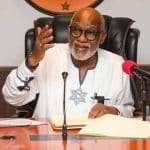The United States District Court for the Northern District of Illinois adjourned a ruling on a subpoena application for Bola Tinubu’s records from Chicago State University (CSU) on Tuesday, just days after the institution denied knowledge of a certificate the Nigerian president submitted to the country’s Independent National Electoral INEC to run for office.
CSU lawyer Michael Hayes testified before Judge Jeffrey Gilbert in Chicago that the school was unable to authenticate Mr Tinubu’s certificate as either fake or genuine, contradicting the school’s previous claims that it issued a certificate to the Nigerian politician after he graduated in 1979.
“Is the diploma authentic, or is it a forgery? My client can’t answer yes to either of those questions,” Mr Hayes said at the hearing in Chicago that began at about 1:30 p.m. (local) and lasted several hours in the lawsuit brought by Atiku Abubakar, Mr Tinubu’s main challenger during the February 25 presidential election.
The lawyer maintained that if asked under oath, the school’s administration would be unable to validate Mr Tinubu’s certificate because they “just don’t know” where or how he received it.
Mr Hayes was replying to the judge’s inquiry concerning the school’s ability to swear under oath that Mr Tinubu received the certificate he presented to Nigeria’s electoral office in June 2022 as part of his final eligibility paperwork.
Submitting questionable documents to INEC is a violation of the Nigerian Constitution, and politicians, including governors, have been removed for similar offenses.
Mr Hayes argued that CSU records proved Mr Tinubu attended the school, but agreed that there were multiple discrepancies that the institution’s administration would be unable to resolve under oath. Among the inconsistencies are the June 22, 1977, date on Mr Tinubu’s certificate, the school’s president at the time the certificate was received, and typographical, typeface, and header issues on the document.
On June 17, 2022, Mr Tinubu presented to INEC a certificate reportedly issued in 1979 and signed by Elnora Daniel. Ms Daniel, on the other hand, came at CSU from Hampton University in 1998, 19 years after Mr Tinubu was claimed to have graduated. She subsequently departed the institution in 2008, 14 years before June 2022, when CSU issued a new certificate in Mr Tinubu’s name in response to a subpoena from a Nigerian lawyer who had enquired about Mr Tinubu’s schooling there.
According to the Nigerian opposition leader’s lawyers, the jarring contrasts prompted Mr Abubakar to initiate the complaint to compel CSU to produce papers relating to Mr Tinubu and make its top officials accessible for deposition to authenticate the produced materials.
The records and depositions are being sought for use at the Nigerian Supreme Court, where the final struggle against Mr Tinubu’s election is now going, according to Alexandre de Gramont, who appeared in court for Mr Abubakar.
Mr de Gramont stated that the Nigerian Court of Appeal upheld Mr Tinubu’s election in its September 6 ruling because the panel lacked CSU’s position on the authenticity of the certificate Mr Tinubu presented, and that the Supreme Court could admit CSU’s position on the document under a special rule.
“Your Honour, we don’t know whether the Nigerian Supreme Court would be receptive to the new evidence or not, but we just want to be able to present the new evidence to them from CSU,” Mr de Gramont said.
“We already have them (the documents). What we are seeking is CSU’s authentication or their explanation for some of the discrepancies.”
Mr Abubakar has until September 20 to appeal the Court of Appeal’s judgement from September 6, which is the first instance court in Nigeria’s presidential election tribunal procedure.
Judge Gilbert stated that the court has historically adopted a liberal and broad approach in granting comparable requests under Section 1782, a legislation that allows papers and evidence domiciled in the United States to be retrieved and utilized in a foreign matter.
Mr Tinubu’s lawyers, represented by Christopher Carmichael via phone conference, said Mr Abubakar was on a fishing expedition, noting that CSU’s prior assurances to the effect that Mr Tinubu graduated from the school were sufficient.
Mr Carmichael stated that there was no need to present additional evidence or put school authorities under oath to testify about the authenticity of Mr Tinubu’s certificate, claiming that the proceeding would merely fuel online trolls because the Supreme Court would not accept fresh evidence even if it was produced.
As a result, Judge Gilbert stated that he would need more time to deliberate before ruling on the matter, but he requested lawyers for all parties to check over the records provided to the court and update them if required in the meanwhile. He stated that the parties would be notified of a date for a final ruling or additional hearing.






